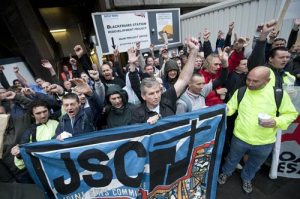If this year’s strikes are to have power, we must take our lead from the electricians, bypassing union attempts at defusion by offering each other solidarity in new ways and across artificial divides, writes Deb Harris.
Solidarity is illegal. Thatcher said so. She only permits us to strike if we have a specific and identifiable common complaint – we are not allowed to strike together in recognition of the general horror. In 2011, submissive as ever, the unions found the only thing that the public sector can legally unite around – pensions – and conveniently forgot that everyone is angry about a lot more than that. Their speeches, placards and leaflets were all about pensions. As if we had given up on anything but retirement.
As if pensions were isolatable from the stress and drudgery of work. And as if work was not stress and drudgery at all. As if it was something to be celebrated, defended. The TUC anthem for the strike, ‘Let’s Work Together’ shows a lot of happy public sector workers winking at each other while they dance through their jobs. The strike was in defence of work as it is. And it was bounded by work: it began when work began and was over when work ended. The strikers were meant to stay at the work door until the pre-planned marches through city centres. We were not meant to move beyond these boundaries, to strike out in other ways, with other people, in other places, and into the night.
As if pensions were isolatable from everything else – increasing rents, prices, repression. The unions try to separate the strikers from the broader causes of their anger, and from the rest of the population. The day, as we were reminded by a Unison rep on one picket line, was a focus on ‘her’ members. It wasn’t about anyone else, anything else, it was about pensions and the public sector’s patronised heroes. Those who don’t have a job, let alone a pension, who couldn’t strike legally even if they wanted to, should do nothing but go home and reflect on the ‘important work that the public sector do’.
Of course thousands rely on the welfare state in order to survive, but, as public sector workers know only too well, any real reflection on state-run services reveals their contradictions, reminds us what else they are important for. It is unlikely that many of those forced to use the state’s services – people claiming job seekers allowance, people on probation, school children – were weeping into their cornflakes over the temporary loss of the public sector, distraught at the thought of being able to go back to bed. It’s much more likely that they enjoyed the short taste of freedom, would like to strike out too.
It is no surprise that a call for solidarity from people who had no right to strike was ignored by local union leaders. A demonstration in Hackney which had used the rupture provided by the strike to block the bus depot and roads as it marched from picket line to picket line, which had met with support from strikers, bus drivers, car drivers, passers-by, was now being kettled by the police at the picket line outside the CLR James Library in Dalston. Two people had been violently arrested and more than thirty were about to be arrested. At the rally for the strike at Hackney Town Hall, a call was made to come to the library to support. The people listening were interested, asked questions.
But standing on the steps above, the local union leaders just blew their horns louder, made speeches more frantically, and told everyone to go to Homerton Hospital – where those who had been kettled would have gone if they hadn’t been stopped. There was no question that people might be offered other options. It was Homerton Hospital or home. ‘You have your tactics, we have ours’. ‘We don’t even know who you are.’ Solidarity is illegal.
Of course there were a few people who disobeyed the megaphone, a noisy crowd of ten who joined the passers-by who had gathered around the kettle. And later that evening, a demonstration outside Stoke Newington Police Station in support of those arrested was much larger: people from the local Kurdish community who earlier that week had been protesting in front of the same police station over the brutal arrests of some of their members; passers-by who had their own reasons to hate the police; and many more who had been striking that day, gathered together in support. Now the strike was over, everyone could show their solidarity as they wished, free from the dictates of the megaphone.
But we don’t need to wait until the union leaders have gone home – we can refuse them even while they stand over us: electricians have shown how this is done – defying legal strikes and dead-end marches with wildcat strikes, road blocks and occupations. When things become more desperate, it will become increasingly clear that we need to break free from union control – that our anger can no longer be channelled into sectors and causes, damned up in slogans and negotiations, locked into laws and stewarded through marches.
As more and more people adopt and expand the tactics of the electricians, we will start to present a much greater threat to the way things are, and the police will be a much larger presence. We will be caught in many more unpredictable situations, in which we will need to fight together whether or not we know each other and whether or not we planned to. It is this sort of solidarity that will frighten the police. It is this, also, that frightens the union leaders.
<출처> http://thecommune.co.uk/2012/02/03/strikes-and-solidarity/#more-7696






최근 댓글 목록